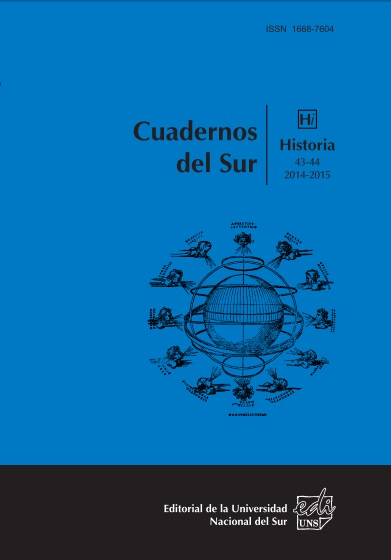Sarah Ellis y la importancia de la educación de las jóvenes inglesas en la época victoriana
Keywords:
Gender, Education, VictorianismAbstract
Together with the spread of the new evangelical movements that emerged in England in the late eighteenth and early nineteenth century, a period of redefinition of social and family ties began. Thus, gender relationships were also regulated within the framework of these reformist doctrines.
Here we analyze the book titled “The Daughters of England: their position in society, character and responsibilities” by Sarah Ellis. Written in 1842, it is part of a series of texts by the same author sharing a common target: women.
With a clear prescriptive profile, this handbook of conduct addressed to young ladies, describes and regulates the characteristics expected of females and the tasks to be fulfilled in terms of their social role.
Using friendly and familiar language, the author aims to generate some reflection on readers in order to defend an alleged complementarity between the sexes, which restricts women’s activities to the domestic sphere.
Downloads
References
Beauvoir, Simone de (2011), El segundo sexo, vols. I y II, Madrid, Cátedra, [1949].
Burstyn, Joan (1980), Victorian Education and the ideal of Womanhood, Nueva Jersey, Barnes & Noble Books.
Chase, Karen y Levenson, Michael (2000), The Spectacle of Intimacy: A Public Life for the Victorian Family, Princeton, Princeton University Press.
Chartier, Roger (1993), “Historia, lenguaje, percepción. De la historia social de la cultura a la historia cultural de lo social”, Historia Social, n° 17, pp. 97-103.
Cominos, Peter (1973), “Innocent Femina Sensualis in Unconscious Confl ict”, en Vicinius, Martha, Suffer and Be Still, Bloomington y Londres, Indiana University Press, pp. 155-172.
Davidoff, Leonore y Hall, Catherine (1994), Fortunas familiares, Madrid, Cátedra.
Gay, Peter (1992), La experiencia burguesa. De Victoria a Freud. I. La educación de los sentidos, México, Fondo de Cultura Económica.
Guevara, Rosa (2000), “¿Quién escribe los manuales? Una lucha por el poder interpretativo”, Revista de Crítica Literaria Latinoamericana, año 26, n° 52, pp. 63-77.
Hamilton, Roberta (1980), La liberación de la mujer. Patriarcado y capitalismo, Barcelona, Ediciones 62.
Héritier, Françoise (2007), Masculino/Femenino II, Buenos Aires, Fondo de Cultura Económica.
Huertas, Rafael (2009), “Medicina social, control social y políticas del cuerpo. La subjetivización de la norma”, en Miranda, Marisa y Girón Sierra, Álvaro (eds.), Cuerpo, biopolítica y control social, Buenos Aires, Siglo XXI, pp. 19-41.
Morant Deusa, Isabel y Bolufer Peruga, Mónica (1998), Amor, matrimonio y familia, Madrid, Síntesis.
Downloads
How to Cite
Issue
Section
License
Copyright (c) 2014 Cuadernos del Sur Historia

This work is licensed under a Creative Commons Attribution-NonCommercial-ShareAlike 4.0 International License.
Aquellos autores/as que tengan publicaciones con esta revista, aceptan los términos siguientes:
- Los autores/as conservarán sus derechos de autor y garantizarán a la revista el derecho de primera publicación de su obra, el cuál estará simultáneamente sujeto a la licencia Atribución-No Comercial 4.0 Internacional CC BY-NC 4.0.
- Los autores/as podrán adoptar otros acuerdos de licencia no exclusiva de distribución de la versión de la obra publicada (p. ej.: depositarla en un archivo telemático institucional o publicarla en un volumen monográfico) siempre que se indique la publicación inicial en esta revista.
- Se permite y recomienda a los autores/as difundir su obra a través de Internet (p. ej.: en archivos telemáticos institucionales o en su página web) una vez publicado su trabajo, lo cual puede producir intercambios interesantes y aumentar las citas de la obra publicada. (Véase El efecto del acceso abierto).








